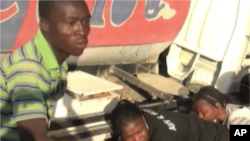Haitian officials say more than 1,400 people have died from cholera, as the outbreak penetrates deeper into the tent communities and affluent areas of the capital. Community health workers and volunteers are on the front-lines, showing people how to avoid the illness and responding when people are sickened.
A tent camp in Port-au-Prince is one of the newest spots for cholera to strike. Residents say nine people from the Dieupuissant family were rushed to the hospital after suffering diarrhea and vomiting.
Resident Anilus Emanuel helped sanitize the tent after the illnesses were reported. "Foreign aid workers gave us a new tarp and other supplies for the family to use when they come back from the hospital."
No one can be sure how cholera entered the tent camp in the Boyer plaza in Petionville. But residents now are reluctant to take water from the public supply.
Pierre France volunteers to educate residents on proper hygiene. "It's frustrating because one aid group used to give us treated water and clean the latrines, but now that has stopped," he said.
One day after news of the latest illnesses broke, a water truck from a popular charity arrives for the first time in months. Women and children rush past the public supply, to load up from the water truck.
"The water from the truck is better because it is treated," said one.
As cholera spreads in Haiti, more communities are affected. Petionville was once seen as a protected, affluent enclave in Port-au-Prince. Landscaped plazas are now filled with tent camps and fears of cholera.
Guerrier Accene lives a few blocks away at another tent camp. "It's dangerous because, if cholera has already reached Boyer plaza, it can be among us at any moment."
Tensions about cholera are running high across Haiti. Residents in the northern town of Limbe blocked health workers from collecting the bodies of cholera victims. Some Haitians say presidential elections set for Sunday should be suspended until the outbreak is under control.
The head of the U.N. mission in Haiti, Edmond Mulet, says the vote must take place. "This is only the beginning of this crisis, and if we don't have elections now, when will these elections happen? When the epidemic is even worse than now?"
At the General Hospital in Port-au-Prince, health officials say they are managing the outbreak. The Dieupuissant family sought treatment here, and hospital officials say they are all doing fine.
Dr. Yves Lambert heads the anti-cholera campaign in the hospital. "We hope that cholera patients who get treatment will return to the communities and educate others about the illness and the need to seek hospital treatment if they have symptoms of cholera," he said.
Community health workers also play a key role in controlling the spread of cholera. These Red Cross workers serve a tent camp that has been cholera-free, so far. They show residents how to properly wash hands, store treated water and take other steps to avoid infection. Workers also can provide first-line treatment to people with symptoms of cholera.
Dr. Lambert says more community health workers will be needed, as cholera fears continue for months and years to come. "We want to have a program that can prepare more and more health workers to watch out for cholera in every department in Haiti," he said.
Volunteers at Boyer plaza are on guard, after the Dieupuissant family was sickened. They have limited supplies of disinfectant and other supplies at their first aid station. But they hope that educating residents about ways to stay healthy will help keep cholera at bay.




